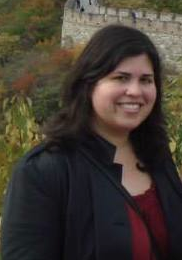The August 2018 Industry Insider interview is with literary agent Linda Camacho. While I often cobble together my own version of a bio for interview subjects, this time around, you get it straight from Linda herself. Enjoy the switcheroo!
“Before I moved to Gallt & Zacker, I was with Prospect Agency and held various roles on the publishing side. After graduating from Cornell in 2005, I interned at Simon & Schuster and Writers House Literary Agency, and worked at Penguin and Random House. Somewhere in there, I got an MFA in creative writing from the Vermont College of Fine Arts.
Besides books, I love chocolate, travel, and far too much TV. In terms of submissions, I’m pretty omnivorous. I indulge in a variety of categories and genres, ranging from picture book to adult, from clean and lighthearted contemporary to edgy and dark fantasy.”
Agency Website: www.galltzacker.com
Facebook: www.facebook.com/linda.camacho19
Twitter: twitter.com/LindaRandom
RVC: As revealed in your bio, you got your start on the publishing side of things. What did your time at S&S, Random House, and Penguin do to prepare you to become an agent?
LC: I worked in different departments in adult and children’s, from marketing to operations and foreign rights. In seeing the other side of the table, as an agent I’m better able to understand the processes of publishing better so that I know what questions to ask and how to better manage the expectations of my clients.
RVC: What’s an example of that insider publishing 411? For example, what’s something you wouldn’t have known to care so much about had you simply started out and stayed on the agent side of the equation?
LC: I definitely wouldn’t have realized the importance of metadata–the basic information about a book that you see flow out to websites like Amazon and Edelweiss, like ISBN, BISAC category, pub date, and such. How a book is categorized and cataloged in the scheme of metadata can affect a book’s discoverability, and, ultimately, sales. It’s all so changeable, really, and I learned about that from working in marketing operations, where I had to worry about those details.
RVC: So you went back to school and earned an MFA from the Vermont College of Fine Arts after you had your foot in the door in the publishing world. How did that happen, and what did the MFA do for you?
LC: I knew I wanted to get a graduate degree, but it had to be in something I was passionate about. I enjoyed writing and, luckily, Random House has a tuition reimbursement program, so while I was working there, I decided to apply. The MFA in writing helped sharpen my editorial skills. Also, having gone through the writing pains, I became much more empathetic with my clients, to say the least!
RVC: Speaking of editorial skills–what’s one of your big grammar bugaboos? What drives you bonkers when you see an otherwise competent manuscript come across your desk but it has this ONE BIG GLARING GRAMMAR ARRRGHH thing happening?
I’ll share mine if you share yours!
LC: Misuse of commas is a big one for me! If someone doesn’t know how to use them, that issue crops up quite a bit throughout the text.
RVC: Oof–that’s a good one. Err, I mean a bad one. Well, you know what I mean.
The grammar gaff that makes my nostril hairs curl is the confusion over it’s vs. its. I tell my students all the time that guessing is not an acceptable option. Write down the two definitions on a Post-It note. Stick said Post-It note to your computer. Glance at said Post-It note as needed. Review regularly.
Its = possessive (The dog licked its paw.)
It’s = it + is (It’s pretty gross to see a dog lick its muddy paw.)
Voila, right?
LC: That has come to mind for me, too, actually! I feel your pain. 🙁
RVC: Alright–back to the interview. One of your clients, Jamie LB Deenihan, and I both took Jane Yolen’s Picture Book Boot Camp together back in April 2017. One of the manuscripts Jamie was working on at the time was When Grandpa Gives You a Toolbox–which you recently sold to Sterling. What grabs you most about this manuscript?
Additionally–I happen to know that this story went through a lot of variations and revisions, as most picture book manuscript inevitably do. How did you know when it was 100% ready to send out? What’s your process for determining that?
LC: Jamie’s so great!
RVC: Totally agree! Plus she knows oodles about pets, picture books, and lemon trees. Just saying.
LC: When Grandpa Gives You a Toolbox definitely underwent quite a few revisions. I provided feedback, but because this was a potential companion book to her first book with Sterling (When Grandma Gives You a Lemon Tree), a majority of the process was between Jamie and her editor. Eventually, Jamie got the manuscript to a place where her editor offered.
Jamie and I had gone back and forth on the manuscript before going on sub and, really, it’s instinct that tells me when to go out on sub. I try to help Jamie get it into its best shape possible and then I send her work out into the world when it just feels ready.
Recently, Jamie and I did go out on sub with another picture book that sold within a few months to a big 5 house and we’re eagerly awaiting the day we can announce that one.
RVC: Congrats on that!
One of the other topics I wanted to ask you about is We Need Diverse Books. How important is this movement in general and this nonprofit organization in specific?
LC: I could go on and on ad nauseam about the importance of the diversity movement, but the best I can say about it is this: It’s long overdue.
Inclusion is not a new conversation by any stretch, but from the moment #WeNeedDiverseBooks went viral, the publishing industry took notice in a way it hadn’t before. Things are changing and while we still have far to go, I’m optimistic it’ll only get better from here. We just have to keep pushing and remembering that this is more than a “trend.”
RVC: Since we’re hitting the biggest PB issues of the day here, let’s go after one more. A few weeks back, Lupine Grove Literary Agency unexpectedly shut down, and a lot of authors who thought they were being properly represented were horrified to discover that nothing could be further from the truth. The Lupine Grove client pool included quite a few PB authors.
Tell me a bit about what the value of a quality literary agent is today, and also how vital trust, honesty, openness, and a collaborative spirit is to its success.
LC: The Lupine Grove discovery was certainly a shock to so many people. Trust is certainly key to the agent-client relationship, so all I can advise creatives is to stay open, trust their instincts, and to keep a supportive community around them.
RVC: It’s time for the lightning round. Ready … GO! Favorite hobbit?
LC: Peregrin “Pippin” Took.
RVC: Neil Gaiman–great English writer or the greatest English writer?
LC: Great English writer. 🙂
RVC: The Hollywood celeb Linda Camacho is most likely to be mistaken for?
LC: I can’t say that I’d ever be mistaken for a celebrity. LOL. An extra maybe?
RVC: “If I never got into the world of writing, publishing, or agenting, I’d instead be …”
LC: Ha–I’d be a divorce attorney. It’s sad and all, but it doesn’t sound dull.
RVC: Longest amount of time it took to secure a deal for a picture book manuscript you repped?
LC: About 5 months. I do have a couple out on sub that have been out longer, so if they sell (fingers crossed!), maybe those will set the new record.
RVC: Shortest amount of time it took to secure a deal for a picture book manuscript you repped?
LC: So far, two months. So nothing too crazy yet!
RVC: Since we mentioned Jane Yolen in this interview… your favorite Jane Yolen picture book?
LC: Owl Moon–it’s so lyrical.
RVC: Three words that describe your dream client?
LC: Professional, hard-working, and kind.
RVC: Thanks so much, Linda!

